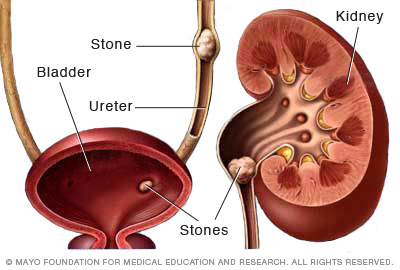-
Health & Wellness
Summer Stones — Kidney Stones in August
Do you know you're at greater risk to develop kidney stones during the month of August?
Kidney stones affect approximately 3.8 million people in the U.S. each year, the number of cases is on the rise and they are especially more common in the summer. The stones are described as small, hard deposits of mineral and acid salts that form when urine becomes concentrated. The minerals crystallize and stick together, forming a stone which can range in size from a grain of sand to a golf ball.
According to Mayo Clinic nephrologist William Haley, M.D., heat, humidity and lack of proper hydration all lead to a higher prevalence of kidney stones in the summer. “The main reason is due to the amount of water we take in and use. Our bodies are made up of mostly water and we use it regularly. But in the heat, we may not be drinking as much as we should, or taking in the right types of fluids, so we become dehydrated, which can lead to more stones.” Dr. Haley adds, "Kidney stones are really very common — up to 13 percent of men, and 6 to 7 percent of women, could get a kidney stone sometime in their life — starting in the twenties and peaking in the fifties." Once you get a kidney stone, you are at risk of getting one again.
Here are tips for avoiding and coping with kidney stones:
- Hydration is key. Drinking more water is essential.
- Diet is also very important to prevent stones. Oxalate-rich foods, such as nuts and certain vegetables, coupled with a diet that's high in protein, sodium and sugar, may increase calcium in the kidneys and subsequently raise the risk of kidney stones.
- Kidney stones may not cause problems until they move into the ureter tube that connects the kidney and bladder. When that occurs, a stone can bring immense pain as it passes through the urinary tract into the bladder. As well, many people can experience an array of symptoms, including nausea, vomiting, blood in their urine or fever. If you experience any of these symptoms, seek immediate medical attention.
Journalists: A video pkg. featuring a patient and separate sound bites with Dr. Haley are available in the downloads. To interview Dr. Haley contact Cindy Weiss, Mayo Clinic Public Affairs, 507-284-5005, newsbureau@mayo.edu
Tune in this Saturday, August 9 at 9 a.m. CT, for the Mayo Clinic Radio show. We'll discuss further why kidney stones are more prevalent during the summer with nephrologist Ivan Porter, M.D., and urology surgeon Amy Krambeck, M.D..








